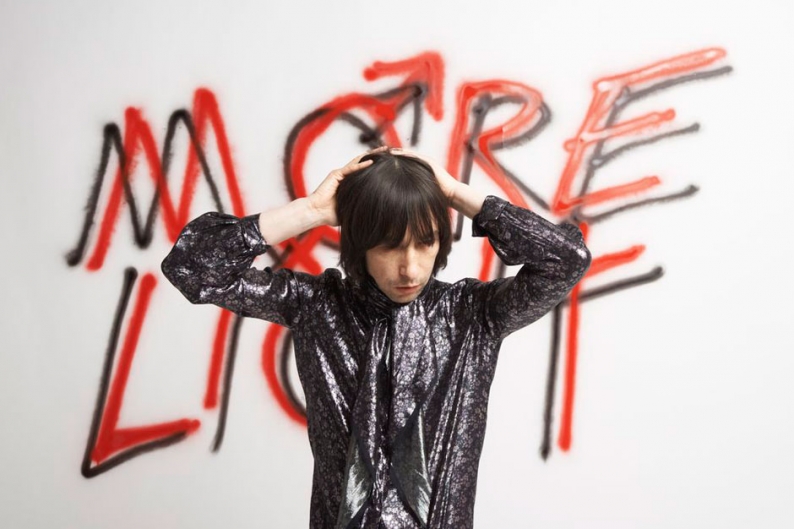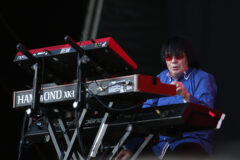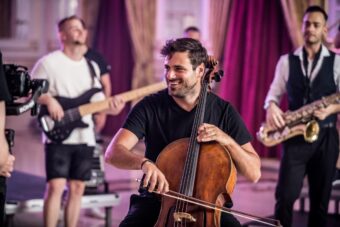In the 26 years that Primal Scream have been actively releasing full-length records, they’ve traversed tremendous ground. From the bleary house-indebted psychedelia that populated early efforts (namely their landmark 1991 album Screamadelica) to the more straightforward rock records they’ve made in recent years, Bobby Gillespie and guitarist Andrew Innes — as well as a rotating cast of others — have subscribed to the philosophy of Spacemen 3: That is to say, they’ve taken a lot of drugs to make music to take drugs to. But in the years since 2008’s Beautiful Future, Gillespie kicked his habits and has emerged, perhaps paradoxically, with one of his most lush and bountiful records to date, More Light.
Talking to SPIN over the phone from London, Gillespie outlined the process behind the new record and how enlisting Steven Soderbergh’s go-to soundtrack man, David Holmes, contributed to the album’s widescreen aims.
You’ve been touring Screamadelica for the last couple of years. When did you find the time to write and record More Light?
It was written over a period of a couple of years. We initially went to Belfast in early 2010 and did a five-day exploratory songwriting session with David Holmes and that was just Andrew Innes and myself. David would play us obscure French avant garde library records, musique concrete stuff. Then after getting us into the mood. He’d throw down some drum loops that he’d made just to see how Andrew and I would react. We started writing songs pretty quickly. Things like “Tenement Kid” or “2013,” I think we got early ideas [during that session]. We saw that David provoked us into writing songs so we took these ideas back to our studio. We’d work for three days out of the week arranging the Screamadelica live project and then Andrew and I would spend the other two days on our own working on More Light. It took months before the songs became more fully fleshed out.
We had a couple of trips to L.A. to write and record, as well. Andrew and I went over there and David would bring in musicians like Jason Faulkner on bass and David Chedwiggen on percussion and we would record some stuff with them. We’d take it back to London and add stuff to it. It was a long process–almost like a collage-type thing as well. We record a lot of stuff that we don’t use.
What was the impetus for those songwriting expeditions?
We went up to Belfast to see if we could strike up a creative relationship with David, really. We wanted to see, most importantly, if that relationship was going anywhere new. After ten days we realized we were on to something good. The real brief was to make an expansive experimental psychedelic pop record. Our previous two albums, Beautiful Future and Riot City Blues, were kind of conventional in terms of their song structure. We wanted to stretch the songs, to use jump cuts and weird time signatures. We wanted to really mess around with the structures of the songs.
Do you think working with David for the first time helped you achieve that?
David brought an open-minded willful approach to experimentation. He had this experience that he’d accumulated over the years from working on Hollywood film soundtracks and he’s always wanting to hear new sounds and for us to create sounds that hadn’t been heard before. He thinks of sounds as hooks. If somebody hears a new sound on a track it’s as much of a hook as a chorus or a guitar riff. It’s a cool way of looking at stuff.
He just has this incredible enthusiasm for the project. He kept encouraging me to write better lyrics. Something like “River of Pain.” I had an early idea and I played it for David on acoustic guitar and he loved it but he said, “You know what Bob, I love the subject matter, but you can get a better verse out of that.” It inspired me to go on and finish writing the song. He assured me that I should go down that road. That’s what you want from a producer, someone to encourage you to be brave and do stuff you haven’t done before.
“River of Pain” sticks out as one of those songs where you might have been stretching yourself more than before.
Oh yeah. “River of Pain” and “Tenement Kid.” Structurally and lyrically, we’ve never really done anything like that. It’s like cartoon-future-Sci-Fi-psychedelia. I love the groove on “River of Pain,” it’s this desert blues folk song. Even before the lyrics start, it conjures pictures in your mind. It’s very cinematic. The middle section where it breaks down has the Sun Ra Arkestra. It has this real sense of mystery and beauty.
How did that Sun Ra collaboration come about?
They were stranded because of a volcano eruption in Iceland. All transatlantic flights were cancelled for a week or ten days so they were stuck. They played three nights in London and I went two nights. A couple nights later I went to go see Lou Reed play Metal Machine Music and I started talking to a promoter he mentioned to me that the Sun Ra guys were stranded and he was trying to do a benefit gig for them. I had the idea that we should hire them to come play on their album so the next day I gave the idea to the promoter and he managed to sort it out that Marshall Allen and three of the other guys came up and played on “River of Pain” and “Sideman.”
Did Robert Plant’s guest spot on “Elimination Blues” have similarly coincidental origins?
You really make your own lot, I think. You’re in the right place at the right time for a reason. I go up to the studio really early. One Monday morning I went up to the area where the studio is in North London very early and I went to this deli/café to buy some food for the week. I was sitting in the window of the café and Robert walked past with his girlfriend and I saw them and tapped the window. I went out and we had hugs and a chat, just asked each other what we had been doing. He had been out on tour. He had come back to London for a week or so. He had some business to attend to before he went back to the States. He asked what the band was doing and I told him we were recording an album. He said, “Oh, I’d love to hear it and by the way, if there’s anything you need me fore you know how to get in touch with me.” I was a bit taken aback and I couldn’t really think on my feet.
I went back to the studio and told Andrew that I had bumped into Robert. We looked at each other and had a light bulb moment — “Elimination Blues.” We had this song that we’d been working on and Andrew always felt that there’d been something missing. He wanted this high voice singing in unison with me like Blind Willie Johnson and his wife. We tried Andrew’s daughter Eva who’s 13 and it didn’t work. I tried singing falsetto and it didn’t work. We called up Robert’s assistant and Robert called later that night asking what key the song was in so that he could bring a harmonica. We told him that he didn’t need to bring one because we wanted him to sing! He came in his very last morning in town to do it. Andrew recorded him. Robert asked for some slapback on his vocals, like Elvis in The Sun Sessions. It was amazing.
“Elimination Blues” and the album closer “It’s Alright, It’s OK” in particular seems to me a summation of the sounds you’ve been playing with your entire career. Is that something you were aiming for with this record?
I think we’ve developed a style over the years that’s uniquely Primal Scream so maybe that’s what you’re referring to. It’s not a conscious thing, but the way that the Jesus and Mary Chain or the Ramones have a style, maybe Primal Scream do as well. It’s not as noticeable because there’s always a variation album to album, but we have a way of arranging songs that’s uniquely ours and I have a way of singing and Andrew has a way of playing guitar. We use things on modal structures like one or two notes all the way through songs. “2013” is just two chords all the way through. It never changes. We’ve done that a lot on previous records.
So what was the stylistic shift you were aiming for this time then?
When we decided to work with David Holmes, we wanted something a little more widescreen, open, and cinematic, but at the same time rock’n’roll. I think [his cinematic background] helped. Andrew and I wanted to make something symphonic and layered, that was part of the idea for this record. David was great with sounds and putting them in the right place. He’s got fucking fantastic taste. A couple of times he said to me, “Gillespie, you’ve written that one before.” That was his way of saying a song was fucking shit.
But Andrew and I are nonverbal in the studio. We’re very instinctive as musicians. Even at first David didn’t know how to deal with that because he’s very chatty. Andrew and I are a little more reserved because we’re really listening and completely focused. We just see where it goes record it and leave it. Even though it’s nonverbal, we eventually find out we’re both thinking the same thing. We have a good psychic relationship.
Was the actual process of recording itself different this time around?
We would just experiment with whatever instrument David had lying around in his studio. Six-string bass or weird keyboards. We would just start making music and then from that we got the early sketches from some of the songs. It wasn’t like two guitars, bass, and drums in a room jamming a solo. It was a lot different in approach than that. We used a lot of musicians that we’d never used. [Longtime Primal Scream bassist] Mani had gone back to the Stone Roses, so David turned us on to Jason Faulkner, who he had worked with on previous records. He introduced Jason to us and we hit it off really well. Jason is on nine or ten of the tracks.
Did the way that the lineup has been shifting affect the record at all?
Well, it’s mostly Andrew and me on the record and Darrin Mooney on drums. We have a live band thing and then we have a studio band, which is different. Barrie Cadogan, who plays guitar live with us, is only on “Tenement Kid.” We’re just making art, we’re not trying to appease anyone’s egos. As somebody throws down a good idea, we’ll keep it. For instance, it wouldn’t have been right to ask Kevin Shields to play on “Goodbye Johnny” or “Tenement Kid,” but it was right to ask him to play on “2013.” For that track, Andrew had laid down some cool guitar, but we were of the opinion that we needed some freak touch psychedelic space rock guitar and Shields is the man for that.
You’ve been sober since pretty much the making of the last album, right? Did you find this process easier than previous albums?
Yeah, around just after that last album got released I got clean. I tried to seriously stop using drugs and taking alcohol in 2007 and I relapsed a couple of times, but now I’m almost five years clean. This is a completely clean record. I changed my life around. I’ve become sharper, I have more feelings, I get more done. I’m in the moment more now. I’ve got my self-respect back and I think I’ve become a better artist, a better songwriter, a better performer. Maybe I haven’t, but I feel that way. David Holmes told me he couldn’t have produced for me if I was still using. Anyway we’ve done it. It’s not big deal. I just don’t do that fucking stuff anymore. But I think this record is the proof. I couldn’t have made a record this good if I was still using. No way. No fucking way.





